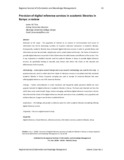Provision of digital reference services in academic libraries in Kenya: a review
Abstract
Rationale of the study - The popularity of internet as an avenue of communication and source of
information has led to decreasing numbers of in-person reference transaction in academic libraries.
Consequently, academic libraries have embraced digital reference services in order to provide library and
information services far and wide, ubiquitously, and in varied modes and formats. The choice of channels to
provide digital reference is essential in that it determines the effectiveness and efficient of the service. Thus
it was imperative to establish channels used by academic libraries in Kenya to provide digital reference
services, by specifically looking at channels used, factors that inform the choice of the channels and
effectiveness of the channels.
Methodology - A descriptive research design and survey research methodology was used for the study. A
questionnaire was used to collect data from heads of reference services in accredited and fully chartered
academic libraries in Kenya. Purposive sampling was used to sample 19 university libraries that were
offering digital reference out of 39 university libraries.
Findings - Twitter, ask-a-librarian or email, facebook, and frequently asked questions (FAQS) are most
popular channels for digital reference in academic libraries in Kenya. The least used channels are live chat
while those never used include: Skype, instant messaging, and library digital reference consortiums .Factors
that informed the choice of the digital reference channels were ease of use; availability; cost; popularity and
software features. Support was the least considered factor.
Implications - The findings will provide a reference point for other academic libraries considering offering
digital reference service.
Originality - This is an original research study.
Collections
- Journal Articles (CI) [118]

